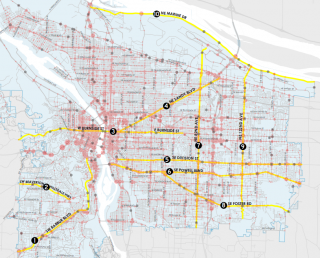It’s looking likelier that Oregon’s legislature will give Portland the right to gradually install 20 well-marked but unmanned anti-speeding cameras on its 10 deadliest streets.
House Bill 2621 was approved by the Joint Ways and Means committee in a nearly party-line vote Monday afternoon, sending the bill to the House and Senate floors.
Fourteen Democrats plus Salem Republican Jackie Winters voted for the bill to move ahead with a “do pass” recommendation. Nine Republicans voted against it.
Portland leaders including Mayor Charlie Hales and Transportation Commissioner Steve Novick have urged traffic safety activists to help them push for the bill. At the recent BikeLoudPDX safe streets rally, Hales told the crowd to “Put pressure on the legislature” to pass HB 2621, and said it would, “Let us use technology to make our streets safer.”
Advertisement
If passed by both houses and signed by Governor Kate Brown, it’ll be a significant legislative victory for the City of Portland, which says unmanned cameras are proven ways to reduce dangerous speeds, and therefore needless deaths.
The city is currently allowed to use manned photo radar cameras for traffic enforcement, but the need for an officer to be present drives up the expense of operating them, reducing their hours of effectiveness.
The city has estimated that the 20-camera program would reduce excessive speeding in their locations by 61 percent, preventing about 1,800 injuries and saving about 16 lives over the next six years. At that rate, the associated economic benefits from prevented collisions would be in the neighborhood of $70 million.
Fines for people photographed driving 11 to 20 mph over the speed limit typically start at $160.
Concerns about the bill have included its privacy implications and questions of whether a surge of automated speeding citations would be difficult for the state’s court systems to process.
You can read more about HB 2621 and Oregon’s 2015 legislative session in our archives.
UPDATE: HB 2621 passed the House today by a vote of 31-24. It is now in the Senate.



